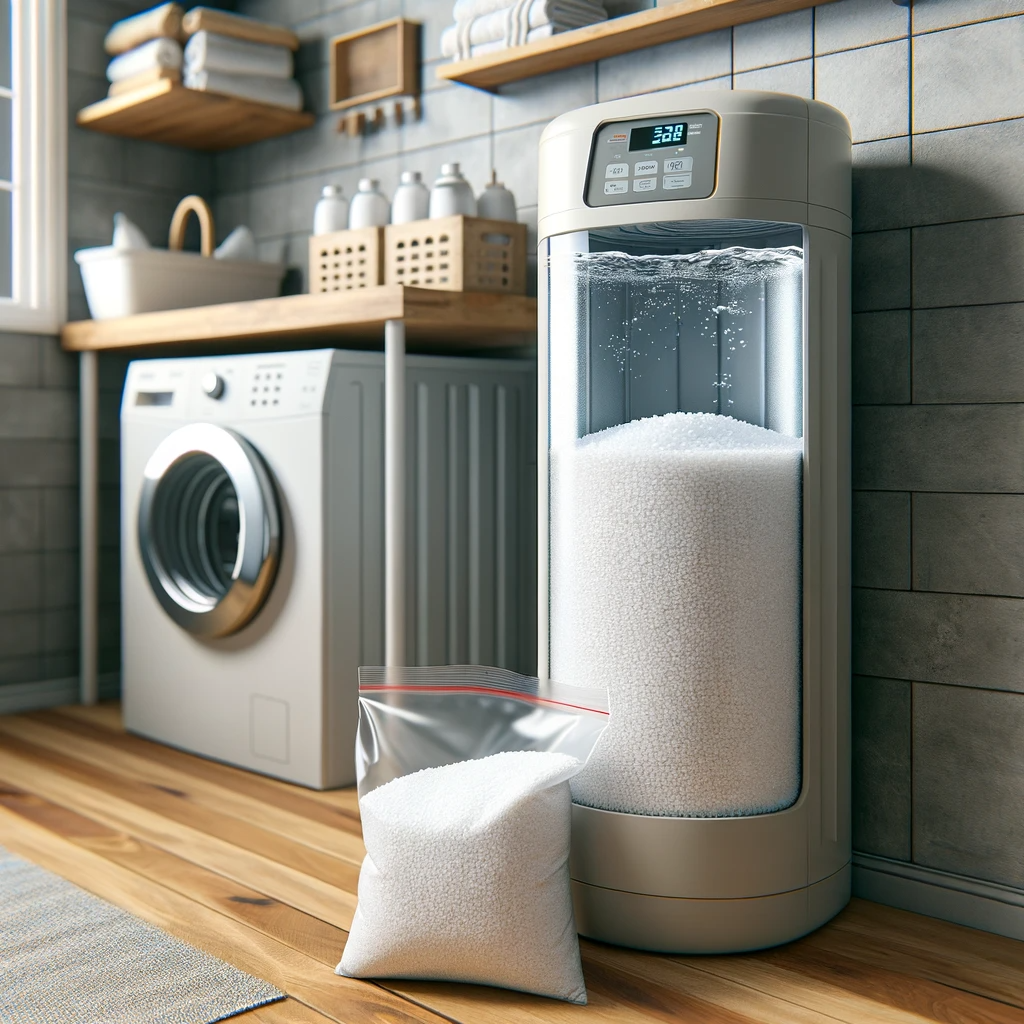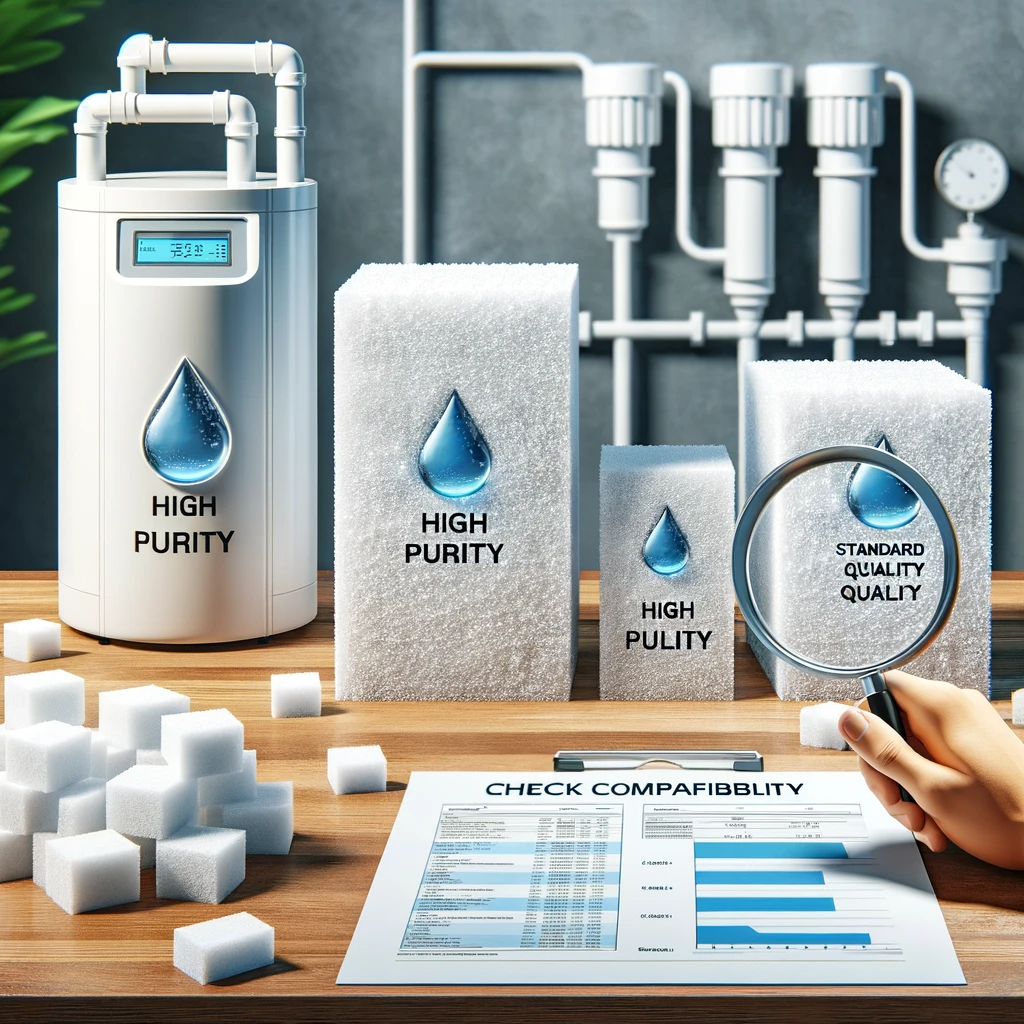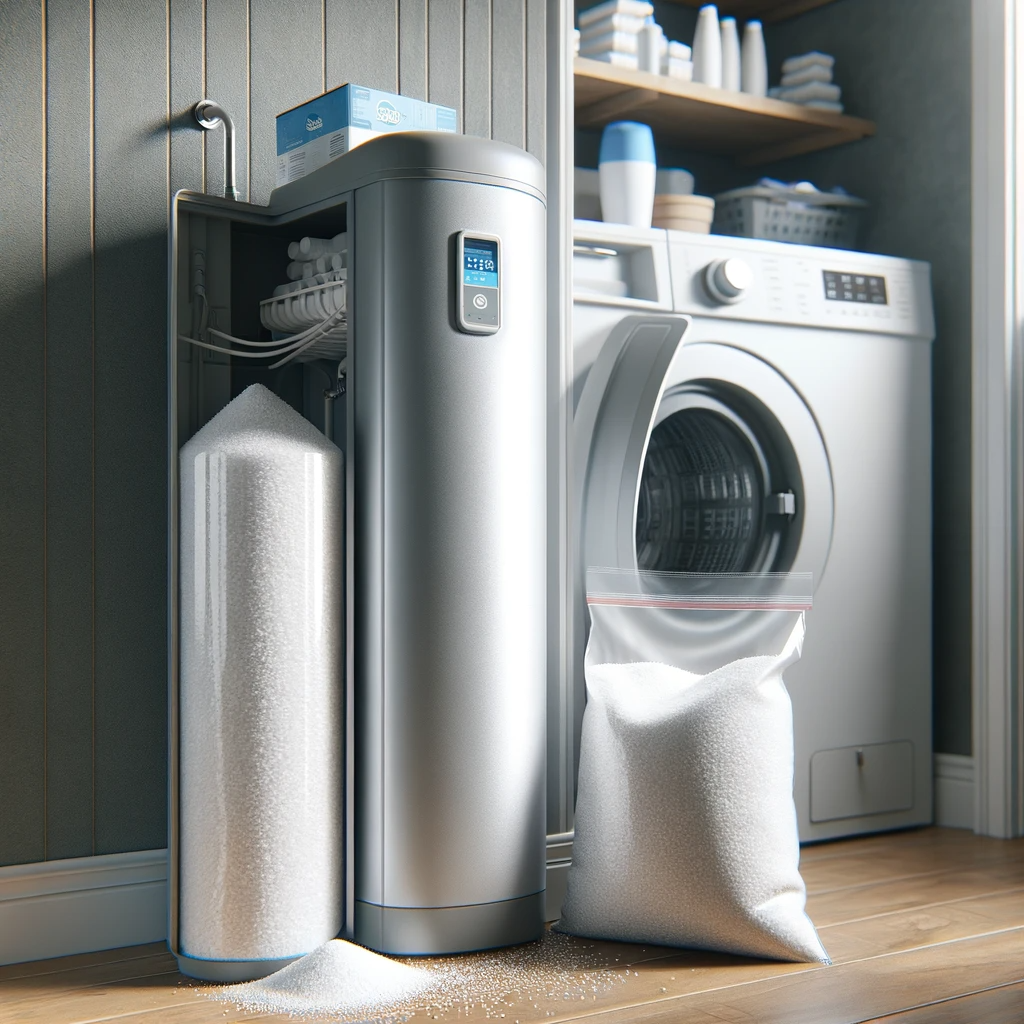Hard water got you down? Scale buildup got your appliances crying uncle? You’re not alone. Millions of homeowners battle the bane of hard water, yearning for that luxurious, lather-inducing soft water we see in commercials. But what if the key to unlocking this oasis lies not in fancy gadgets or pricey treatments, but in a simple, chunky block of… salt? Yes, we’re talking about block salt, and the question on everyone’s mind is: can I use Block Salt in my water softener? Buckle up, water warriors, because we’re about to dive deep into the salty truth and answer that burning question once and for all!
Ensuring your water softener operates efficiently contributes significantly to prolonging its life and maintaining water quality in your home. Water softeners are essential in areas where hard water is prevalent, as they remove mineral ions that cause scaling and plumbing issues.
Block salt, a popular choice for many softener models, is known for its convenience and ease of handling. Before adding block salt to your system, always check the user manual or contact the manufacturer to avoid any damage to the equipment. Using the correct type of salt not only enhances performance but also conserves resources and reduces the need for frequent maintenance. Block salt’s compact form and low residue make it an attractive option for homeowners seeking a hassle-free solution to hard water problems.
Understanding Block Salt
Are you pondering over the use of block salt in your water softener? Dive into the world of water softening. Discover how block salt powers a water-softening system.
What Is Block Salt?
Block salt is a crucial component in many water softeners.
- Made from pure, evaporated sea salt
- Compacted into solid, rectangular blocks
- Environment-friendly and convenient to handle
Block salt comes in packs of two. Each pack easily fits into your water softener without a mess.
How Does Block Salt Work?
Block salt makes water soft by a process called ion exchange.
- Insert block salt into the softener’s brine tank.
- Water dissolves the salt, creating a brine solution.
- The solution washes over resin beads inside the softener.
Calcium and magnesium, which make water hard, cling to the resin.
Soft water flows through your pipes.
Water Softener Basics
Understanding your water softener is key to ensuring your home has soft, scale-free water. Whether considering block salt options or exploring functionality, basic knowledge proves invaluable. Dive into the essentials of water softening below.

What Is A Water Softener?
Water softeners are essential household appliances. They remove minerals that cause water hardness, notably calcium and magnesium. Hard water can lead to limescale buildup in pipes and on appliances, affecting their efficiency and lifespan.
How Does A Water Softener Work?
A typical water softener uses an ion exchange process. It swaps hard minerals in water with sodium or potassium ions. Over time, the softener’s resin beads become saturated with minerals and require regeneration using a brine solution.
Types Of Water Softeners
- Salt-based softeners: Regenerate with a saltwater brine.
- Salt-free softeners: Use a salt-free process for conditioning water.
- Dual-tank softeners: Have two resin tanks for a continuous supply of soft water.
Selecting the right type depends on your household needs and the specific water characteristics in your area.
Using Block Salt In Water Softeners
Many homeowners ask about block salt for water softeners. Is it right for your system? This part of our blog dives into the use of block salt in water softening systems.
Compatibility Of Block Salt
First, check if your softener works with block salt. Some models need specific salt shapes. Read the manual or contact the manufacturer. This step prevents damage and guarantees the best results.
- Manual: offers guidance on salt types.
- Manufacturer’s advice: ensures safe use.
Benefits Of Using Block Salt
Block salt comes with great advantages:
- Ease of use: Handling and loading blocks is simple.
- Less mess: Fewer spills compared to loose salt.
- Compact storage: Blocks save space.
These points make block salt a popular option for many households.
Considerations Before Using Block Salt
Keep these in mind before switching to block salt:
| Consideration | Detail |
| Softener Model | Ensure it fits your device. |
| Cost | Compare with other salt forms. |
| Availability | Find a reliable supply. |
These considerations help make an informed decision about block salt use.
Installing Block Salt In Water Softeners
Water softener systems often require specific types of salt to operate efficiently. Many users prefer block salt due to its convenience and ease of handling. Below, gain insights into the correct installation of block salt in your water softener.
Preparation For Installation
Begin with preparation to ensure a smooth installation process:
- Confirm your softener’s compatibility with block salt.
- Gather necessary tools, such as gloves and a clean cloth.
- Ensure power to the softener is turned off as a safety measure.
Step-by-step Installation Process
- Open the salt compartment of the softener.
- Clean any residual salt or debris from the tank.
- Place the block salt carefully inside the tank.
- Check the alignment; it should sit flat at the base.
- Close the compartment and restore power to the unit.
Maintenance Tips For Block Salt Usage
Adhere to these maintenance tips for optimal performance:
| Frequency | Maintenance Task |
| Monthly | Check block salt levels and refill if necessary. |
| Quarterly | Inspect for salt bridges and break them apart. |
| Bi-Annually | Clean the brine tank to prevent salt mushing. |
Keep an eye on the unit’s performance and adjust salt levels accordingly.
Effectiveness Of Block Salt
The importance of the right type of salt in a water softener could mean the difference between efficiency and frustration. Block salt is a hot topic for discussion among those considering the maintenance or purchase of water softeners. Let’s delve into how block salt stacks up in performance, its influence on water hardness, and its impact on your salt consumption.
Performance Compared To Other Salt Types
Unlike granular or tablet forms, block salt is compact and typically purer. This purity means no added anticaking agents. Fewer impurities lead to:
- Minimal residue in your water softener tank
- Better functionality of the system due to less cleaning
- A consistent supply of soft water
Effect On Water Hardness
Using block salt can have a direct impact on water hardness. Due to its solid form, it dissolves evenly, producing a more consistent brine solution. What does this mean for your water?
| Result | Explanation |
| Efficient ion exchange | Fewer minerals like calcium and magnesium left in the water. |
| Less buildup | Pipes and appliances stay cleaner for longer periods. |
Effect On Salt Consumption
When it comes to consumption, block salt can be more economical over time. It allows for:
- Precise dosage due to its uniform shape
- Longer intervals between refills
- Overall reduced usage when compared to other types
By understanding the effectiveness of block salt in these key areas, you can make an informed decision about its use in your water softening system.
Common Issues With Block Salt Usage
Many homeowners use block salt in water softeners for simplicity. But some common issues can arise from block salt usage. Let’s explore these problems.
Blockages And Bridging
Block salt can sometimes lead to blockages or bridging in your softener:
- Salt blocks might not dissolve properly, creating clumps.
- These clumps can block the pathways where water flows.
- A bridge can form when salt sticks together above the water level.
To prevent blockages, check and stir your salt regularly.
Excessive Salt Usage
Your softener might use too much salt:
- If settings aren’t optimized, high salt consumption occurs.
- Improper sizing of the softener can lead to overuse.
- Regular monitoring ensures efficient salt usage.
Adjust settings based on water hardness and family size for optimal use.
Compatibility Issues With Certain Systems
Some water softeners might not be suited for block salt:
- Older systems are often designed for granular or tablet salt.
- Using block salt in these systems can void warranties or cause damage.
- Always refer to the manufacturer’s guidelines before switching salt types.
Choose the right salt for your system to avoid any compatibility issues.
Tips For Optimal Block Salt Usage
Ensuring your water softener runs efficiently is vital. The type of salt you use can make a big difference. This section provides valuable insights into using block salt effectively. Follow these tips to get the best out of your water softening system.

Choosing The Right Type Of Block Salt
Not all block salts are equal. Look for purity levels when selecting. Higher purity means less residue. This keeps your system in top shape. Also, check if your water softener has specific requirements. Some models require particular kinds of salt. Always read the manufacturer’s recommendations.
Proper Storage And Handling
Block salt must stay dry. Moisture can cause it to fuse, creating handling problems. Store salt blocks off the ground. Use a clean, dry area. Ensure hand safety. Gloves can prevent possible skin irritation when handling salt blocks. Also, keep the salt away from pets and children.

Regular Maintenance And Cleaning
Regular check-ups extend your softener’s life. Empty and clean the brine tank every 6 months. Inspect for salt bridges. These are hard crusts that form and prevent salt from dissolving properly. Break any bridges you find. Use warm water to clean. This dissolves salt residues. Wipe the tank with a clean cloth after washing.
- Choose salt with high purity for less system residue.
- Keep blocks dry to prevent clumping.
- Wear gloves when handling salt for safety.
- Conduct a half-yearly clean-up of your brine tank.
Alternative Salt Options
Knowing all your options for a water softener is smart. Block salt is common, but other types work too. Let’s explore the different salts you can use.
Granular Salt
Granular salt dissolves easily. It’s fine for most softeners. Just pour it right in. Here’s what makes granular salt a choice to consider:
- It works fast.
- Less residue means less cleaning.
- It’s perfect for regenerating resins in your system.
Tablet Salt
Tablet salt is compact and convenient. It comes in round shapes. It’s very popular. Check out these benefits:
- Tablet salt is less messy.
- It offers consistent softening performance.
- Easy to store and handle.
Pellet Salt
Pellet salt looks like small nuggets. It’s a top pick for many homes. Discover why pellet salt might be a good fit:
| Pros | Considerations |
| Clean and pure, so less tank residue. | Can be more expensive. |
| Good for bridging prevention in softeners. | Some softeners might not favor pellets. |
Frequently Asked Questions Of Can I Use Block Salt In My Water Softener
What Is Block Salt For Water Softeners?
Block salt is specifically designed for use in water softeners, providing a convenient, compact, and efficient method for regenerating the softening resins.
Can Any Softener Use Block Salt?
Not all softeners can use block salt; compatibility depends on the manufacturer’s design, so consult your manual or contact the manufacturer.
Benefits Of Block Salt Over Tablet Salt?
Block salt tends to be purer, easier to handle, creates less mess than tablet salt, and can lead to more efficient regenerations and system maintenance.
How Long Does Block Salt Last?
The lifespan of block salt varies according to water hardness and household water usage, but typically it needs replacement every two months on average.
Are There Environmental Impacts Of Using Block Salt?
Using block salt in water softeners can have environmental impacts, including increased sodium in wastewater and potential challenges with disposal of plastic packaging.
Conclusion
Wrapping up, block salt is indeed a viable option for many water softeners. Its purity and ease-of-use offer distinct advantages. Always confirm compatibility with your system and consult your manual for the best results. A well-chosen salt can significantly enhance your water softener’s performance.


Leave a Reply